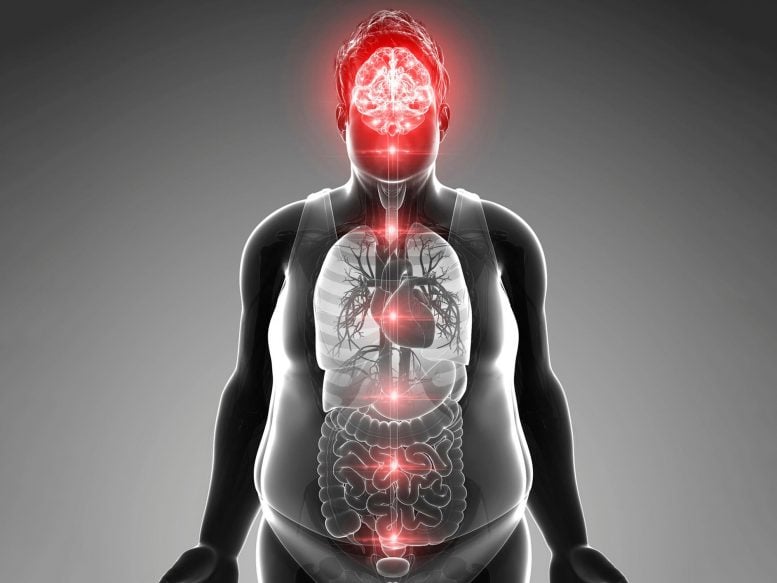Summary of Brain on Fat: Study Reveals How Diet May Drive Anxiety:
New research in mice indicates a strong connection between obesity and anxiety, possibly influenced by alterations in brain function and gut bacteria. Mice on a high-fat diet became obese, exhibited anxiety-like behaviors, and showed different brain signaling and microbiome patterns compared to lean mice. This suggests that the gut-brain axis might play a crucial role in this relationship.
*****
- Recent research in mice suggests that a high-fat diet might influence anxiety-like behaviors.
- The study indicates a strong link between obesity, brain function changes, and gut bacteria alterations.
- Young mice fed a high-fat diet showed distinct brain signaling differences from their lean peers.
- The gut-brain axis appears to play a crucial role in the interplay between diet, mental health, and overall well-being.
The Dynamic Duo: Diet and Anxiety—A Deep Dive into the Brain on Fat
In our quest for wellness, the trendy "mind-body connection" has claimed a lot of the spotlight, yet often overlooked is the vibrant backstage player—the gut. Imagine your diet as the director, your gut as the stage, and your brain—not as the mighty wizard behind the curtain, but a lively lead character. Welcome to the biological theater where the plot takes guts and brains.
Recent scientific exploration has unveiled an astonishing narrative. A study conducted with young mice—like a Pixar production with less animation—suggests that a diet high in fat does more than broaden the waistline; it might also twist the brain into an anxious knot. So why should we care about these furry little scholars? Because, my friend, although they maneuver through mazes, stuff themselves with pellets, and spin in wheels, their biological symphony resonates with ours. Let’s unfold this multifaceted tale with a sprinkle of curiosity and a dash of intrigue.
The Gut-Brain Axis: An Invisible Highway
Visualize a bustling highway. Along this thoroughfare, messages zip back and forth between the gut and the brain, akin to cars filled with commuters and caffeine. Known as the "gut-brain axis," this remarkable communication network ensures that the brain is acutely aware of what’s cooking (literally) in the belly. As researchers have probed deeper into these exchanges, an intriguing subplot emerges—our gut bacteria, the microbiome, are not passive passengers; they’re more like secret agents with a hand in everything from hunger to humor.
Obesity, Anxiety, and a Tale of Two Mice
Picture, if you will, two groups of adventurous mice starting an epic diet journey. One troop is treated to a high-fat feast, while the other munches on a lean menu. As days trickle into weeks, these dietary choices begin to craft a splintered reality. The chubby indulgers soon wear visible evidence of their dietary devotions. But it’s not just about the scale; these plump little explorers exhibit what researchers term as "anxiety-like behaviors." In their tiny world, this means less willingness to venture out and explore, hesitation mirrored in human terms by anxious thoughts and unease.
Meanwhile, beneath those twitching whiskers, seismic shifts are underway. Scientists observed distinct changes in the brain’s signaling patterns in these mice. Some areas bristled with heightened chatter, suggesting a state of heightened alertness often linked with anxiety. It’s like our brains hitting the gas pedal when we’re stuck in traffic—unproductive and unsettling.
Microbiome: The Unsung Hero or Villain?
Let’s get microscopic for a moment and dive into the mysterious realm of gut bacteria. In this study, the verdant landscape of the gut microbiome transformed under the influence of a high-fat diet. But it wasn’t an idyllic meadow; it was more of a turbulent jungle. The diversity of bacterial species skewed unfavorably—a curious case of quantity versus quality.
In lean mice, the gut thrummed with a harmonious balance, akin to an orchestra playing in perfect sync. In contrast, the high-fat diet mice experienced a bacterial cacophony, where certain strains turned bossy, potentially stirring up trouble. These microbial residents, in their bacterial fashion, can affect inflammation, mood, and indeed, anxious vibes.
Reflections for the Everyday Explorer
So, what do these findings whisper to us as we peruse our own pantries? Here lies not just a cautionary tale about dessert indulgences but a veritable map for understanding how our diet chisels our mental resilience. Let’s be real: Does embarking on a lettuce-only daily ritual guarantee a life devoid of stress? Hardly. However, what dances on our plates may have a role in choreographing our mental symphony.
Fuel for Thought, Literally
Now, let’s imagine this: food not as fuel but as a vital component of self-care, unlocking potential and peace of mind. What if the daily apple or serving of greens becomes a morsel of empowerment, not a mundane duty? The tantalizing truth is that dietary choices can reinforce our brain’s capacity to remain buoyant in tumultuous times.
Steering clear of dietary dogma is key. Moving instead towards mindful eating—relishing each bite, savoring flavors, textures, and aromas. Inviting the occasional treat aids more than restriction; it abates anxiety itself.
The Way Forward: A Fork of Destiny
Whether you’re embarking on a gastronomic journey or navigating life’s emotional labyrinth, the relationship between diet and mental health offers compelling food for thought. It invites us to honor our nutritional choices as pieces of a broader well-being puzzle.
As we traverse this path of discovery, consider involving creativity—building a plate as an artist composes on canvas. Weighing choices not with judgment but with curiosity. Every forkful holds the potential for transformation—as intricate and powerful as the invisible interplay of gut and mind.
The science that links obesity, anxiety, and our brain’s response to diet is more than a prediction of doom; it’s an invitation. A chance to reflect on our habits, a cause to harmonize our plates with purpose and integrity. In a world where we are deliciously diverse, our choices are ours to craft—with each bite and every thought.
Beyond the Horizon: Embracing the Journey
Though this study conducted in mice opens countless questions, it offers a novel glimpse into the subtle orchestra that is our physiology. The dance between neurons and notions, the whispering of gut bacteria, and the crescendo of life’s infinite possibilities all remind us to be mindful captains of our ships.
As we stand at the edge of this discovery, the spotlight beckons us to not just comprehend but celebrate the profound interconnectedness of our internal landscapes. Change, after all, is a feast—let’s sit at the table together.

